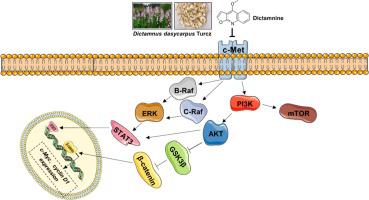BIOCHEMICAL PHARMACOLOGY ( IF 5.3 ) Pub Date : 2021-11-30 , DOI: 10.1016/j.bcp.2021.114864
Jiaojiao Yu 1 , Lijing Zhang 1 , Jun Peng 2 , Richard Ward 3 , Peiqi Hao 1 , Jiwei Wang 1 , Na Zhang 1 , Yang Yang 1 , Xiaoxi Guo 1 , Cheng Xiang 1 , Su An 4 , Tian-Rui Xu 4

|
Dictamnine (Dic), a naturally occurring small-molecule furoquinoline alkaloid isolated from the root bark of Dictamnus dasycarpus Turcz., is reported to display anticancer properties. However, little is known about the direct target proteins and anticancer mechanisms of Dic. In the current study, Dic was found to suppress the growth of lung cancer cells in vitro and in vivo, and to attenuate the activation of PI3K/AKT/mTOR and mitogen-activated protein kinase (MAPK) signaling pathways by inhibiting the phosphorylation and activation of receptor tyrosine kinase c-Met. Moreover, the binding of Dic to c-Met was confirmed by using cellular thermal shift assay (CETSA) and drug affinity responsive target stability (DARTS) assay. Among all cancer cell lines tested, Dic inhibited the proliferation of c-Met-dependent EBC-1 cells with the greatest potency (IC50 = 2.811 μM). Notably, Dic was shown to synergistically improve the chemo-sensitivity of epidermal growth factor receptor-tyrosine kinase inhibitor (EGFR-TKI)-resistant lung cancer cells to gefitinib and osimertinib. These results suggest that Dic is a c-Met inhibitor that can serve as a potential therapeutic agent in the treatment of lung cancer, especially against EGFR TKI-resistant and c-Met-dependent lung cancer.
中文翻译:

白鲜宁是一种新型 c-Met 抑制剂,通过下调 PI3K/AKT/mTOR 和 MAPK 信号通路抑制肺癌细胞的增殖
白鲜宁 (Dic) 是一种从 Dictamnus dasycarpus Turcz. 根皮中分离出来的天然存在的小分子呋喃喹啉生物碱,据报道具有抗癌特性。然而,人们对 Dic 的直接靶蛋白和抗癌机制知之甚少。目前的研究发现,Dic 可在体外和体内抑制肺癌细胞的生长,并通过抑制 PI3K/AKT/mTOR 和丝裂原激活蛋白激酶 (MAPK) 信号通路的磷酸化和激活来减弱其激活。受体酪氨酸激酶c-Met。此外,通过使用细胞热位移测定(CETSA)和药物亲和力响应靶稳定性(DARTS)测定证实了Dic与c-Met的结合。在所有测试的癌细胞系中,Dic 对 c-Met 依赖性 EBC-1 细胞增殖的抑制作用最强(IC 50 = 2.811 μM)。值得注意的是,Dic 可协同提高表皮生长因子受体酪氨酸激酶抑制剂 (EGFR-TKI) 耐药肺癌细胞对吉非替尼和奥希替尼的化疗敏感性。这些结果表明,Dic 是一种 c-Met 抑制剂,可以作为治疗肺癌的潜在治疗剂,特别是针对 EGFR TKI 耐药和 c-Met 依赖性肺癌。







































 京公网安备 11010802027423号
京公网安备 11010802027423号